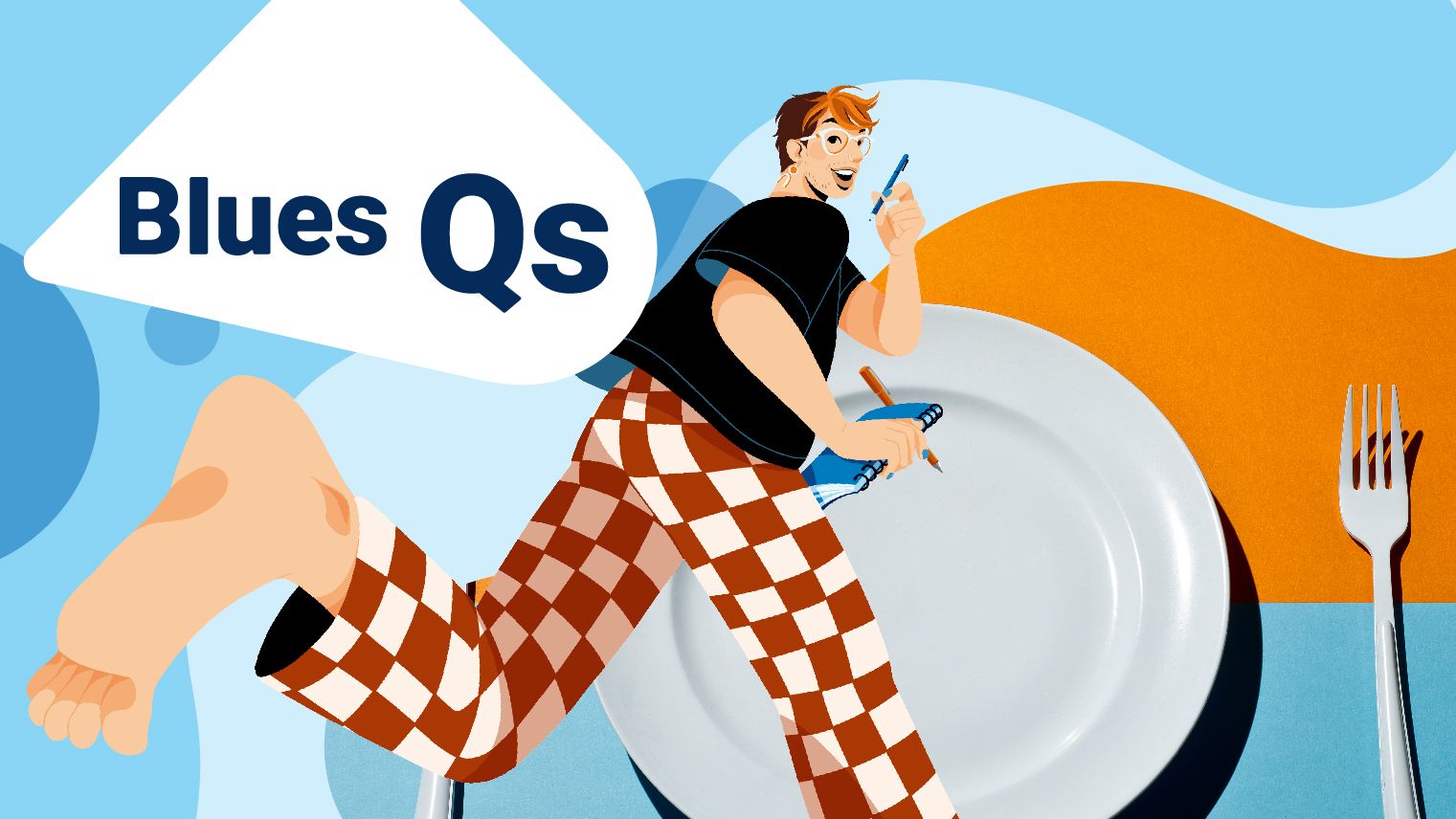Blues Qs: What Can You do When Depression = Zero Appetite?
November 09, 2022
Content created for the Bezzy community and sponsored by our partners. Learn More

Illustration by Ryan Hamsher
Blues Qs is an advice column covering all things clinical depression, written by Bezzy Depression community guide Sam Dylan Finch. Diagnosed with clinical depression over a decade ago, Sam has seen it all — from medication mishaps to grippy sock “staycations.” He’s here to help you navigate your own depression journey with a little humor and a lot of heart.
A few years ago, I hit rock bottom with my depression. I stopped being able to take care of myself — showering became difficult, concentrating at work was impossible, and I was rapidly losing weight from not eating enough.


The struggle to eat
One symptom of depression we don’t talk about nearly enough is losing one’s appetite. Few acknowledge how dangerous a symptom this is. Food is life, and without it, our health suffers severely.
This couldn’t be more true for my own situation — my lack of appetite morphed into complex health problems, including severe anemia, malnutrition, and an eating disorder.
Fortunately, my therapist noticed my difficulties with food, and he helped me connect with a dietitian and an eating disorder recovery program. From there, I began the long and arduous road of reintroducing food into my life.
Getting the nutrition you need
If you find yourself without an appetite, the first rule is this: You still have to eat.
It’s important to eat whether or not you “want” to. It’s important to eat whether or not you feel up for it. It’s important to eat because eating food is what sustains your life. Malnutrition can have serious health consequences, and it’s absolutely crucial that you eat enough to avoid such complications.
If you’re struggling to eat, even when you know you should, I have some tried-and-true advice that I hope will help.
1. Consider meal replacement drinks
Sometimes it’s much easier to drink your food than eat it, especially when you’re depressed. I recommend trying out Orgain nutritional shakes (they’re my personal favorite), especially the iced mocha flavor. But any meal replacement drink will do!
Ideally, you won’t be living off of liquids forever, but if it’s the difference between not eating and drinking a nutritional shake, definitely opt for the shake. However, I do recommend consulting with a doctor about any meal replacement strategy, to make sure you’re still getting what you need.
2. Seek out a dietitian for support
A dietitian, especially one who specializes in eating disorders (which have significant overlap with depression), can be a helpful resource in navigating low appetite. A dietitian can help you figure out what foods are easy for you to prepare, address any anxieties you have about food, and develop strategies for increasing your intake.
3. Screen for an eating disorder
Because of the increased risk of eating disorders for people with disorders like depression, it’s always a good idea to take a screening test for eating disorders to ensure there isn’t something deeper going on.
4. Opt for simple, pre-prepared foods
You don’t have to make elaborate, home-cooked meals. You can opt for foods that are simple and already prepared to ensure you’re getting enough to eat. Please remember that it’s more important that you’re fed than anything else — malnutrition has serious health risks, including making your depression worse.
5. Keep your diet simple
If you’re concerned about nutritional variety, consider the “thirds method.” This is a method that I personally learned in eating disorder treatment. When looking at a typical dinner plate, divide it into three parts: a third starch, a third protein, and a third fruit or vegetable. This will help give you a variety of nutrients, while not requiring that you obsess about calories or nutrition facts.
6. Set alarms on your phone
If you have trouble remembering to eat consistently, set alarms on your phone. Remember that unless you’re on a specialized diet, you should eat three meals daily, with 1 to 3 snacks depending on your hunger levels and nutritional needs. This equates to eating roughly every 3 to 4 hours.
7. Don’t freak out about weight gain
It’s very normal to gain weight after a period of restriction. This doesn’t mean you’re doing anything wrong. If you have concerns about weight gain, speak to a dietitian who can help assess your unique needs and situation.
The bottom line
Keep eating — frequently and consistently. Unfortunately, losing your appetite is a normal symptom of depression. It’s incredibly important to take action if you’re not eating enough. I also recommend reading this Blues Qs column about emotional eating if you’re curious about why it’s important to eat consistently. As I wrote there, the brain is neurologically altered by periods of restriction, making consistent nutrition an important part of recovery.
Medically reviewed on November 09, 2022
1 Source


Like the story? React, bookmark, or share below:
Have thoughts or suggestions about this article? Email us at article-feedback@bezzy.com.
About the author